An Interview With Railroad Earth: Andrew Altman, Carey Harmon, John Skehan & Tim Carbone January 20, 2016 15:02

Any time we are able to catch up with one of the many nationally touring artists we follow, it's a very special occasion. This past Sunday night, we were fortunate enough to sit down with Andrew Altman (upright and electric bass), Carey Harmon (drums, percussion, vocals), John Skehan (mandolin, bouzouki, piano, vocals), and Tim Carbone (violins, electric guitar, vocals) of Railroad Earth, before they took the stage at Iron City in Birmingham, AL.
Interview and Photos by Jordan Kirkland :: Live & Listen
Railroad Earth's sound is so diverse and unique, ranging from rock, folk, jazz, and bluegrass. I know when I hear your music, I hear inspirations from so many different artists. Which of your biggest musical inspirations do you hear in your music?
John: Well, not to sound over pandering or lovey dovey to my fellow band mates, but I think what I hear is the influence of Timmy (Carbone), Andrew, Carey, Todd, and everybody. We come together, and everybody does what their instincts tell them to do. It's a pretty open forum to say, "I like that. I don't like that." I don't know that there is any external artists that have a tremendous influence, other than what each everyone of us have been molded and shaped by. And then it's the six of us hashing things out, either amicably, or sometimes at loggerheads. But it just ends up, where it ends up, right?
Andrew: Yeah, it's true. Part of the reason that I think the band sounds as diverse as it does, or unique, as you mentioned, is because we all have such wide ranging influences, separately among us. By the time it comes to creating a thing together, those influences have become so watered down that it becomes the band's sound. That's how it gets filtered through everybody else.
Tim: I would agree with that. Each one of us on our particular instrument could probably point to different to people who have influenced them. But as a whole, we are some total of the collective consciousness of the band, I guess.
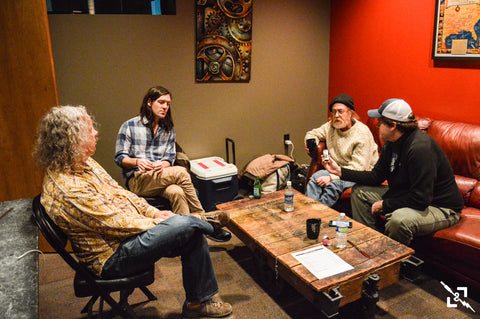
The band has just begun a lengthy Winter Tour, spanning from coast to coast. While the band claims New Jersey as its home base, much of your music has a southern, bluegrass feel, with many references to Colorado and life out west as well. Where do you feel the most at home, musically?
Andrew: Hmm...The United States? (laughs). We're very fortunate because the kind of music we play...this comes up sometimes when the whole genre topic comes up, or someone wants to use the word "jamband." None of the band tried to cater to a certain audience, but that's the audience who showed up and embraced the band. So it doesn't really matter where we go. There is a certain subset of music lovers that are looking for what bands like ours provided. And friends of ours that we have out on the road, whether it's Greensky, Cheese, or Yonder. Other bands that we kind of run in a similar circuit with. Wherever we go, people show up and seem to be looking for that. It's not like we go to one area and feel more appreciated than anywhere else.
Tim: In fact, with these first four shows, we have seen multiple people who are actually on tour with us. And they come from multiple places. That happens quite frequently. Not as much in the summertime, because that is festival season. Large groups of people coming from various regions will converge on the festival lot. So it is kind of the same thing. There are places that we are stronger, in terms of a draw.
Andrew: Yeah, we draw more people in Colorado, but that doesn't mean we feel more at home there. Another great example is Lawrence, Kansas, we have the rowdiest crowds every time we play. The most insane crowds...in Lawrence, Kansas. You know what I mean?
Tim: They crowd surf in Lawrence, Kansas.
Carey: I would say the exact same thing for Birmingham. Over the years, the Workplay shows were always really over the top. Every time we would play there, I would just be like "Holy crap. Where did they all come from?"
Several bands have told me that there is nothing like coming down south. Does it seem like there is a different, rowdy energy down here?
Andrew: The people are outgoing, for sure. I don't notice it as much, because I was born in the south. I was born in Atlanta and grew up in North Florida. So it just feels like normal to me. People will come right up to you and say, "Hey! That was great!" You get a little bit of that in other places, but it seems like there are more people of that nature down here.
Tim: I think it's because you guys like your corn in a jar. (laughs)

Railroad Earth has been going strong for 15 years now. You've successfully progressed from the bar scene to many of America's most prestigious venues. When looking forward, where do you aspire to be as a band 10 years from now?
Carey: Just to still be making people happy, while we're making ourselves happy. As long as we're still really enthusiastic about it, I think that would be where we want to be, for me. It's not necessarily an audience or venue, or anything like that. I don't think that matters nearly as much. But yeah, that's what it would be to me...us still feeling really good about what we're doing, and I think that will translate regardless. That's the important part.
Andrew: Yeah, being inspired is key, you know? There are always people that come to support us, and that always helps. But you get up there, and you could play Red Rocks every night of the year, but if you're not excited about it...that's what has been driving this band for so long. When you get out on stage, even those songs that you've played a million times, you're still going to get to that point in the show where its like, "What's going to happen now?" For me, that's the inspiring part. Also, when we get in the studio, like we did on the last record, there were moments where it was like, "Is this new thing we're trying going to work?" We need to revisit that pretty soon too.
John: Yeah, I think what everyone has said so far is key. As long as we're interested and inspired by what we're doing, then hopefully people continue to reciprocate that interest. Whatever the next creative project is, I hope that it's necked the same way next month, next year, or ten years from now. Every time we do pull ourselves together in particular on a studio project, we do something pretty different than the last time we've done so, and usually in a different format. The record before the last one that we did was very much a production piece; a producer kind of selected the songs and chose how they were going to be executed.
With the most recent record, we went into the studio and threw spaghetti at the walls for weeks until we kind of billed it down to a batch of songs that seemed to fit together and tried some experimental stuff that we had never tried before as well. So long as we keep taking those steps and trying new things, trying different things and yielding something challenging and different for us each time, that's the key, and that's what will make us happy. And hopefully people will still want to listen to it.
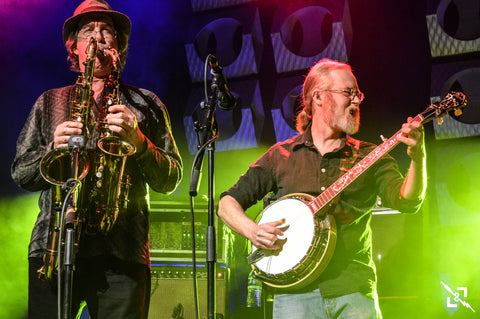
How is the writing process balanced throughout the band? Are most songs more of collaboration, or are individual members bringing different tunes to the table? Take me behind the scenes of an RRE writing process.
Tim: Typically, Todd (Sheaffer) is our principle songwriter, and he'll bring in songs that are in the various stages of completion, and everyone adds their little part to it, then we work on the arrangement. That seems to have worked really well in the past. With the last record, like John was saying, we got in the studio and just threw spaghetti at the wall until we made lasagna. So, I don't know what it will be with the next record. Our process seems to be evolving a bit. We've done some rehearsals where we just get together and throw out ideas, so that's kind of a cool way to work too. So there are a couple of different processes. Normally, someone will bring in a song, and we'll all flesh it out with our own parts, and we throw it back and forth to each other until we come to an agreement as to what the song is going to sound like.
John: I'd say on just about every record, with the exception of the self-titled one, which was really at the hands of a producer, Todd will often come in with a number of songs that are mostly fully finished and realized with well-shaped arrangements around them. They're usually things that he has worked out that kind of go together, often have a pretty strong context in whatever has happened in the life of the band in one way or another in the recent years. We also kind of have one foot on either side of the line. Todd will bring in these very fully realized pieces.
We will also then be working on something...it could be something that Carey and Andrew are laying down as a groove or warm-up in the morning. I'm thinking of the song "Morning Flies," and how that song came about, where Todd will just hear something in it and being to write as it happens. So I'd say with each record, there has been at least one, if not a couple of examples of things that evolved out of the jamming/rehearsing process that also stood up side by side with the songs that Todd more or less fully realized. Then each of us will have a bit of one thing and a bit of another thing, and we'll put it together. It might end up as an instrumental piece, or it might also end up with lyrics.
A song that Tim and I wrote called "Crossing The Gap" started out as a fiddle tune riff. He said "I've got an idea for that, and it matches this idea that I have here." So a little bit of a spontaneous germination of something that just happens out of the air, messing around. I think "Hard Livin" was basically a kind of spoken word riff on "keep the change" at the beginning of Obama's campaign. Then we were groovin' on that idea and that riff, and Todd came back and had the idea for the song as it is now, completely different. Then there are things that just deliberately get molded and worked together that stand next to, as I said before, these finished ideas that Todd comes in with. So you always have kind of a mix.
Tim: There always seems to be at least one instrumental on each album, which John is largely responsible for.

What usually comes first: the music or the lyrics?
Andrew: It depends. I mean, everyone writes differently. Todd is the main writer, and I think he does a little bit of both. I can't speak for him 100%, but seeing the way songs have come in...he's said to me as much, you know? He starts playing and sees what happens. There are other times where, like John said, we've had a jam and Todd will come back later and say, "Oh, I liked that thing you were playing." In my case too, I've contributed a song or two to the band. There were some lyrics that I had, and every groove that I tried to come up with it for it just didn't work, and they just sat there. Then we have an instrumental thing, and someone realizes those lyrics are what it needed.
Tim: With Todd's process, sometimes he'll have an idea for a melody, chord changes, and then he'll just sing "gobbledygook" until he, the way he has described it, until the song reveals itself to him in a way. He doesn't call it songwriting. He calls it "singwriting."
Andrew: That's usually how it works for me too. You're kind of playing a chord progression, and you have a vibe you're going for. You'll just start singing some crap, but one line will just catch. So that's one way of thinking about it.
Tim: Like the song that John was mentioning, "Crossing The Gap." I had the idea for the song and I had probably two thirds of the words. I had been singing it to myself as I was driving across the gap. I live on the other side of the Delaware Water Gap. I would travel that way all the time. For a couple of years, I had the melody in my head, and I had the words. I'd sing it to myself all of the time. I didn't even bother recording it. Two or three times a week I would sing it to myself as I was driving across. That's never happened to me before.
John: With Todd's process, the singwriting thing, I've sat and listened to rehearsal tapes. He's not just singing "la la la" or anything. There are consonants and vowels that fit and have a cadence, and every now and then a word or two. I've sat there listening over and over again thinking, "Well what is he saying? It's not quite there, but there's something." Then you hear it start to evolve, or becomes something completely different. I've sat and studied and tried to find clues as to what might be coming. What is the idea and where is the song headed? It's kind of remarkable, and it's fun to watch.

Recording and touring with Warren Haynes last year must have been a special experience. What do you feel that you guys took away from this experience, both individually and as a band? Did you learn anything about Warren that you didn't know before?
Tim: Well, we didn't really know him all that well, so I don't know if we learned anything that we didn't know before, because we didn't really know him to begin with. I had a really good time. It was a good experience. It was interesting because normally you will go into a studio, and you’ll have an idea of what you're doing. You might have a demo or you've heard the song before, but not in that situation.
Andrew: He had them, but he didn't reveal any of them to us. (laughs)
John: The first question I asked was, "Are we going to get some demos?" So it was hard to be prepared, and he deliberately wanted us to learn a song, sitting in a room just like this, go through it and get the chord changes. Maybe talk about the arrangement if he was unsure about certain things. Then we go out and do three takes, and see if we got it. If not, maybe another take or two, and then, on to the next song, and we start over. So it was really fun, but almost dizzying in that way. To the point where you've got a bunch of rough mixes back to listen to...a song would start and I would have no recollection of recording it or learning it. We knocked out 25 or 26 songs...
Tim: Yeah, 26 songs. So essentially there is another record's worth of stuff lying around sometime. And some of the songs were interesting. He decided to hold back and record them around some time closer to midnight, like "here are the nighttime songs that we are going to work on."
Andrew: For us, as a band, for us to get in the studio, in the absence of our own project at the time, it was just good to get in and do the creative thing again. Bringing in our different instruments and being able set up different kits. For all of us, just trying to get out different stuff.
Carey: It's just such a different gear, and I don't necessarily spend as much time as some of these guys do on other projects in the studio, so it was great to just go in somewhere, get around somebody's songs and go to it in a different framework. Honestly, it was great to work on different music than what we come up with too. There was a little less responsibility. There was a great deal of freedom in creating your part and everything, which was great. I thought Warren was pretty chill about all of that. But you were still coming in and working on someone else's music, which we don't do all that often.
A lot of these were songs that he had been kicking around for a long time, but none that we knew. I give credit to him for his vibe and at the same time how together he was about presenting what he wanted without having to tell you what he wanted. The way that he put the song out, it was clear enough that...fortunately I think we hit off well enough that it was like "Oh, ok I know what goes with that." And it seemed like most of the time, we hit it. We all kind of felt the same thing about takes.
Tim: Oh yeah. The only overdubs I did were on songs that didn't make it onto the record. That was only because John and I came up with the string arrangements that I recorded with two, three, five, or six violins.
Carey: Yeah, it was a lot more songs.
Tim: Yeah, the only overdubs I did were on true string arrangements, but they didn't use them on Ashes & Dust. Everything else came straight from the takes.
John: I think that the general m.o. of the whole thing was if we got to the point of doing too many takes, we would realize that we were playing this better before we really knew it.
Carey: Very often it was the first take. Many times it worked that way.
Tim: It was cool. I enjoyed the process, and I enjoyed his company while we were doing it.
Carey: Such a great storyteller. He has a lot of stories, but he keeps your attention when he's telling them to you.
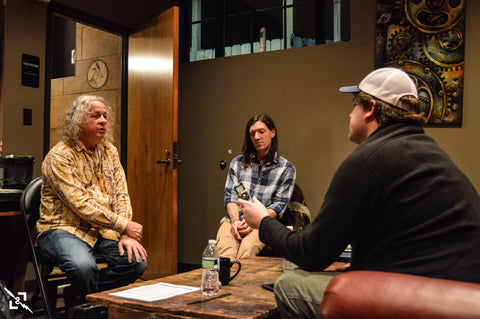
Over the years, you guys have performed "Terrapin Station" many times. I've always felt a similarity between the Terrapin Suite and the song "All That's Dead May Live Again." Was there a notion of that song being the band's masterpiece as it was written? Was the song in any way inspired by the Dead?
Andrew: Well to me, lyrically, they're very different. Once I again, I can only speak so far for Todd. Topically, they are very different. One is expressing a sentiment, while the other is telling a story, you know, "Lady With A Fan" and all of that.
Tim: "Terrapin Station" is about a bus station for turtles, or something like that, right?
John: Train station.
Andrew: But on that notion though, I'm taking the context of Terrapin being a suite, like an extended 20 minutes. And we have this thing that we did that was kind of like that. That didn’t inspire it. Phish also has these long, extended pieces. There are a million prog rock bands, like Rush, I mean 2112, that's a whole album like that. You know what I mean? There's a bunch of bands in a bunch of genres that do that. So it's not saying, "Ok, let's go do this." If anything, for us, I think its more inspired by not the band, but the audience.
We have the kind of audience that gives us that type of freedom musically, to try thing and to push ourselves. So, a lot of times in our shows, we were doing these sorts of things anyway. We'll make up a transition to go between two songs, and this was just kind of a studio version of that. Half of those instrumental things...a couple of them were just made up on the spot, and a couple of them were little things that John had that we were able to flush out a little bit. So we just took kind of what we do live anyway and flush it out a bit.
John: Some of the notion had come because we had been, off and on, not every night, but at times experimenting with more transitions between preexisting songs and changing it up. How do you get from this one to this one, and what does that allow us to do in-between? What is that new territory? We continued to try that, so some of the thought was, can we take that idea of stringing several pieces of music together, but write it, structure it, compose it, and does it all fit? Is it satisfying as a piece? So let's try and think in terms of a larger form.
Andrew: So in that sense, the only connection is has to Terrapin is that they both exist, and they're both played for fan bases that will indulge you. (laughs)
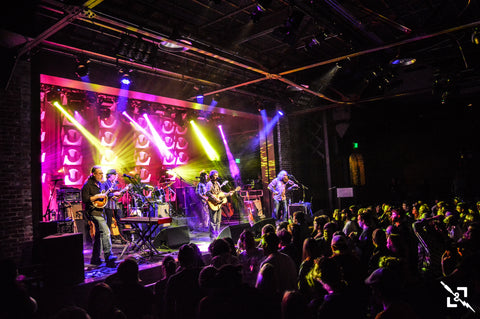
The calendar for 2016 is filling up fast, as usual. With this tour running through mid-march, will there be much of a break before Spring/Summer dates. What does the band have planned aside from touring? Will you focus on side projects, or potentially work on a new album?
Andrew: We're still waiting to see. There are some of us who will always be involved with side projects. Tim especially does some stuff with producing and playing with other people. Me personally too, I just enjoy creating music. I always prefer it to be with this band, but that doesn't always work with everyone's schedule. Usually we take April and most of May to give ourselves that time to have a break. The music stays fresh, so when we come back, we never want it to feel like we're showing up for work. You want to feel excited for the summer, because you've spent time for your family, you know? We all have families now.
Tim: I have a couple of things going, but I always have a couple of things going. I have my side project, Contribution, that I have with Keith Moseley (String Cheese Incident) and the drummer is now Duane Trucks (Hard Working Americans/Widespread Panic). Once we have some time in mid-march, I'm going to finish tracking and mixing what will become our next record. I'm writing and recording another record with another songwriter. It's a completely different type of music. It's more like folk-alt-rock-weirdness. Which is kind of cool, because you get to do something completely different. But I like to do that kind of stuff.
Andrew: It's time for the band to do some new things. That's why we started in November with rehearsals and recording them. Like John was saying, just making things up, recording them, and putting them somewhere where we can all listen to them. Maybe some lyrics will come to them, or they'll be instruments. Maybe they will be a bridge to something else. And maybe April will be that time. I guess that conversation has to happen pretty soon, but April might just be that time.
Tim: I think we came up with some pretty interesting ideas that are there for the finishing, so to speak. You know, it's a process when we're trying to move on to the next level, whatever that is.
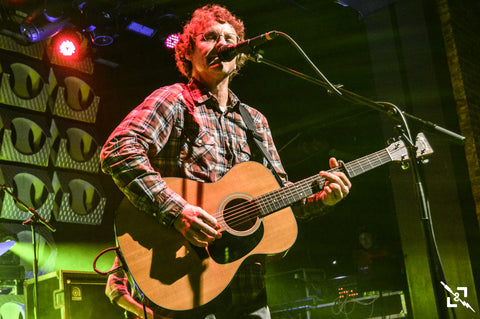
I'm sure everyone in the band has there various hobbies and interests aside from music. In the rare occasion that you're not preoccupied with music, how do you most enjoy spending your free time?
John: Ripping apart different parts of my weird, old house, and trying to figure out how to rebuild them. Renovate, restore, and rebuild them. Just various, half-assed, weird home improvement projects.
Andrew: For me, just anything active really. Running, riding my skateboard, snowboarding, riding my bike. Anything like that.
Tim: I like to fly fish. Anytime I can do that, and the weather is nice, I do it. Sometimes I even go in the winter.
